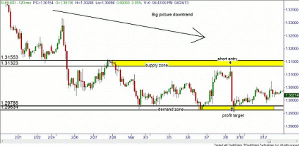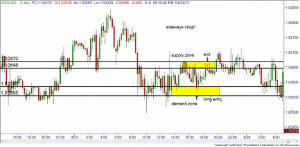If you treat each trade as if you have to justify it to an employer, it can help keep you from taking foolish trades, says Rick Wright of Online Trading Academy.
One of the great things about being an instructor for Online Trading Academy is the fact that the head honchos let us instructors personalize our classes. Of course, we all teach and trade with the OTA core strategy, which you should know by now: trade with the bigger picture trend, wait for pullbacks to our high quality demand zones or rallies to supply zones, use an entry technique that fits your trading style, etc. That part doesn’t change from instructor to instructor or class to class. What I mean about the ability to personalize class is that we get to bring a lot of our own personalities to class instead of having “canned” jokes and limited commentary of our own. If we instructors were required to read from a prepared script all day every day, I would have left years ago!
Recently, one of my additions to my stack of tired old jokes and stories about my dogs was your “interview” process. This is a very similar to a Brandon Wendell Lessons From the Pros article from a couple of weeks ago. In it, Brandon mentioned a question he asks himself when he is trading alone. To paraphrase, “Would I want my students to see this trade?” In essence, are you taking a trade that you can justify to someone else, or are you just taking any old trade at any price point? He is “fooling himself” into acting as if he is trading in front of others.
So, back to the interview. During my classes, I basically tell people that they are not only learning how to trade for a living, but they are actually going through a week-long interview process with “Rick Wright Hedge Fund Traders LLC Incorporated Unlimited a la mode.” Or something close to that. The point is, every supply/demand zone and every trade has to be justifiable to a boss who has your career in their hands. If you were working for me, there would be a few strict rules that must be followed, otherwise you are “fired” from this imaginary job. Here are some basic rules:
- Always trade with a stop loss. Every time, no excuses.
- Never add to a trade that is going the wrong direction—averaging down. Only losers add to losers.
- Never move your stop loss the “wrong way”—willing to give back more than the original plan.
- Be smart greedy, not dumb greedy.
- If you don’t like dogs, you are fired.
And a few more that you will have to be in class to hear!
NEXT PAGE: Good vs. Bad Trade
|pagebreak|I tell the students in class that when they are trading at home, they must always trade as if they are working for someone else to hold themselves accountable. Brandon won’t take trades that he wouldn’t be happy showing students, and none of you should take trades that a boss would frown upon! Because believe it or not, traders are not self-employed. They either work for a company who can fire them, or they have the market as their boss. If you disrespect the market (your boss) by taking foolish trades, not putting in your stops, etc., the market will fire you by taking money out of your trading account little by little or a lot by a lot!
Let’s take a look at a couple of charts—one that is an easy-to-justify trade, and one that isn’t.
As you can see, the overall picture of the EUR/USD is a downtrend with lower highs and lower lows. We wait for a rally into a good supply zone to go short, and use a previous demand zone for our profit target. Occasionally these easy and obvious trades do show up!
Now, try to justify this trade to your boss:
The USD/CAD has been in an ugly sideways choppy range, and you decide to force a trade from a low-quality demand zone. A handful of pips later, you exit this trade. How many things were wrong with this potential trade? The reward to risk ratio would have been about a 1:1, first of all. If you take those trades at Rick Wright Hedge Fund Unlimited a la mode, you would get a warning on the first trade and fired on the second! The market had a clear sideways direction, but certainly not an easily tradable channel. The trade was also done during the slow part of the trading day, around 5:00 pm EST. There are probably more bad things about this trade, but how bad do you want to be yelled at for doing a silly trade? The important thing to note is that you can occasionally make money on bad trades, but you can’t make a career taking bad trades.
The main take-away is this: trading can be a lonely job. You have to be able to hold yourself accountable to someone or something, your “boss” if you will. Sitting at home for hours or weeks on end can certainly cause us to become a little sloppy or complacent. By playing little mind games with ourselves—fooling ourselves, if you will—that you will have to present or justify each trade to someone else can help keep us from taking foolish trades.
By Rick Wright, Instructor, Online Trading Academy












